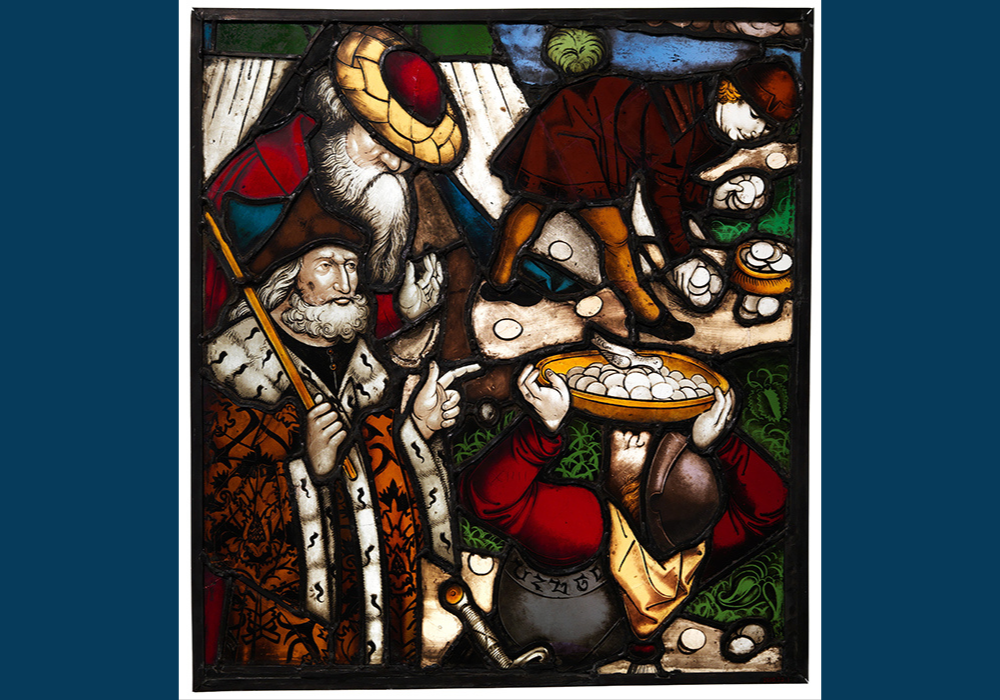
"Gathering Manna," by Workshop of Friedrich Brunner, based on a design by Jan Pollack, circa 1497-99, depicts Moses, at left, and his brother Aaron behind him, watching as the Israelites gather up manna as food. (Metropolitan Museum of Art)
The fox said to the Little Prince, "It is only with one's heart that one can see clearly. What is essential is invisible to the eye."
That one simple line from The Little Prince is one possible introduction to the Gospel of John. We can understand much of John's Gospel as variations on that theme. As John leads his readers through meditations on Jesus, he repeatedly highlights people who interpret Jesus' message very literally, only for Jesus to lead them into something much deeper.
Today, as we continue our journey through Chapter 6 of John's Gospel, we begin with the story of God's gift of manna in the desert. Moses' frightened and hungry people told him they wished he had left them to die in Egypt. The journey toward freedom was too hard. Oh, how humans can varnish memories of the past, gilding it while they whine about the present!
The desert wanderers longed for the good food that they remembered, whether or not they really had it. Still and all, they felt real hunger until God (via nature) provided them with all they needed to survive. Although the name "manna" means something like, "What on earth is this?" they later called that mysterious desert food the bread of angels (Psalm 78).
As we pick up on John's meditation about the bread of life, we hear echoes of the beginning of his Gospel. The people who had eaten with Jesus one day, sought him the next. They asked, "When did you get here?" That question echoes the question of Jesus' first two followers, who asked, "Where are you staying?" Jesus' response was, "Come and see" (John 1:37-40).
Aware that his popularity came more from food rather than his message, Jesus invited those looking for him to get beyond their fixation about eating well (a task the frightened or materialistic can hardly accomplish) so that they could feel and feed their deeper hunger.
Thinking that maybe they should toil harder or differently, the group asked Jesus, "How can we do the works of God?" Trying to move them beyond a shallow world of meaning, Jesus responded that it's not a matter of tasks, but a new way of understanding life, "Believe in the one [God] sent."
That response not only told them there was more to life than good food, but it also undermined any idea that they could make themselves worthy of God. Like he did with Andrew and his companion, Jesus invited them to seek to understand who he was and why he was among them. That was the invitation to belief.
Advertisement
Jesus tells them that, like their ancestors in the desert, God is offering Jesus to them as the bread that gives life to the world. When they say, "Give us this bread always," they have no idea what they are asking for, but the request opens them to what Jesus wants to offer.
The people who chased after Jesus saw him as a wonder-working supplier of bread and fish, but he wanted them to hunger for more from him. In a country like ours, most people don't look to Jesus for their basic needs. Our world offers an overabundance of things and experiences to distract us from our real hungers.
We can be mesmerized by outright lies or the manipulative promises of advertising. Shallow entertainment and owning the best clothes or car (add what you will) feeds our spirit on the equivalent of junk food. Things that offer superficial purpose and a shallow sense of security disconnect us from the deep need for meaning and the mystery of life, the needs unique to us as humans.
A major problem we share with the Israelites in the desert is that the road to freedom from trivialities seems too hard and costly. The manna they and their descendants remembered with such nostalgia hardly seemed a feast at the time. Their desert time was a hard pilgrimage and time of fasting, not so much from food as from their illusions about what mattered most. For us, the journey to the heart, to allow ourselves to feel our deepest hungers is frightening because we know there's no quick fix to the vulnerability we discover on that road.
Paul says as much to the Ephesians with the image of putting on a new self, a true human being who cannot be satisfied with futile pursuits or deceitful gratifications. What Jesus calls belief in him, Paul describes as renewal "in the spirit of your minds."
Today's liturgy invites us to have the courage to ask Christ, "What are you doing here? What do you want to offer us?" If we really live into these questions, we will learn that the bread of life is here for us in many varieties, even though it seems invisible to the eye.
